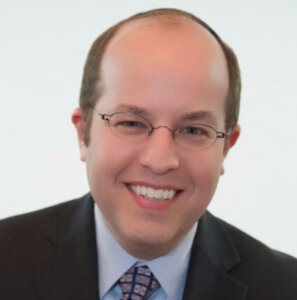A group of Orthodox Jews pray over tombs at the cemetery on the Mount of Olives in Jerusalem in January 2023. Photo by Ahmad Gharabli/AFP via Getty Images
Where we are buried sometimes says more about our values than where we live.
Our society is much more transient than years ago. Families rarely all live in the same city, let alone coast or country. My parents both grew up in New York, I grew up in Georgia, my wife grew up in South Carolina and now we live in Connecticut. Our children are both in America and in Israel.
Where is home? The question is not as simple as it may seem.
When my mother passed away suddenly in the U.S., I did not fully understand my parents’ choice of burial plots in Israel. I knew intellectually that burial in Israel is woven into the fabric of our faith. It is an ancient practice.
In the Bible, Abraham purchased a plot for his wife Sarah. Joseph told his children and grandchildren that he wanted to be reinterred from Egypt to Israel. These biblical stories inspired generations of Jews to go to great lengths to be buried in Israel. In fact, Jewish law codifies the practice as a worthwhile custom, a minhag.
There is also a deeper eschatological reason offered for burial in Israel.
One of the thirteen principles of faith in Judaism is revival of the dead, known as techiyat hametim, which tradition teaches is set to occur during the Messianic age. The miracle will take place in the land of Israel. The bodies of those who are buried outside of Israel will burrow through the earth until they reach Israel, and there their souls will be reinstated in their bodies.
This is a painful process. As a result, burial in Israel is believed to facilitate a smoother and easier resurrection. The Mount of Olives cemetery in Jerusalem is a particularly popular burial site, believed to be where the resurrection will begin. In order to smooth out this process, many choose to be buried in the soil of the Holy Land.
Yet, in those moments after my mom’s death, real human emotions emerged and I still wondered why we were not burying her in the U.S. so we could visit the grave. Were we not sending my mother away from home?
I began sitting shiva when the plane with my mother left my view (those were the days when we could walk to the gate) while my father and brother escorted my mother to her final resting place in the hills of Beit Shemesh outside of Jerusalem.
It is true that a part of me wished she would have stayed in the U.S. But over time, I have learned that all roads lead to Israel for the Jewish people. At some point, my mother’s descendants and our families have made and will continue to make trips to Israel. Some of us may even decide to make it our permanent home.
As antisemitism also rears its head, the transient and often painful story of the Jewish people in the Diaspora has become more real for all of us. Thousands of Jews annually move to Israel.
All that being said, I will never forget the words of one of my mentors, Rabbi Aharon Rakeffet, who shared with me and my peers a stirring message. I was newly married living in Israel for a year while studying for ordination. “The Torah describes the redemption occurring when we will return upright to the land of Israel,” he said. “Do not come horizontally when you are no longer living but come to Israel vertically, standing upright.” His words still haunt and inspire me.
All roads eventually lead to our homeland, Israel. The choice of burial in Israel affirms a timeless value not only for us but will lay the foundations for our families generations to come.

I hope you appreciated this article. Before you go, I’d like to ask you to please support the Forward.
Now more than ever, American Jews need independent news they can trust, with reporting driven by truth, not ideology. We serve you, not any ideological agenda.
At a time when other newsrooms are closing or cutting back, the Forward has removed its paywall and invested additional resources to report on the ground from Israel and around the U.S. on the impact of the war, rising antisemitism and polarized discourse.
This is a great time to support independent Jewish journalism you rely on. Make a gift today!
— Rachel Fishman Feddersen, Publisher and CEO

